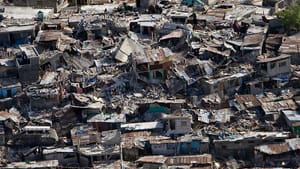Stay in the Loop
BSR publishes on a weekly schedule, with an email newsletter every Wednesday and Thursday morning. There’s no paywall, and subscribing is always free.
Haitian Filmmaker Raoul Peck explores two years of disastrous “assistance”

“I always have Haiti in my mind.” That’s Haitian-born filmmaker Raoul Peck, in conversation last week with Louis Massiah, director of Scribe Video Center. The Scribe program also featured two of Peck’s recent films, Moloch Tropical and Fatal Assistance, shown in collaboration with International House.
Massiah had asked Peck to talk about his films as essay films, in the tradition of French filmmaker Chris Marker, and Peck returned again and again to his Haitian connection. “An essay film is your own personal reflection,” said Peck, “including your doubts and contradictions.”
Profit vs. the human exchange
Massiah said one of Peck’s earlier films, Profit And Nothing But! (2001), was an example. Distributor Icarus Films describes it as an “exploration of the profit motive and its consequences on our day-to-day lives, our history, and our outlook for the future.”
“The film is about capitalism in Haiti,” said Peck, “shown through a village’s experience. The world today seems to be a place where everything is based on profit. I try to show the human being in that world, and by contrast the richness of human exchange.” He noted that if he had made a straight “news” documentary about the village, the story would be dated by now. The essay form allows the viewer to appreciate the big picture.
Fatal Assistance
2013’s Fatal Assistance (Assistance Mortelle), a critique of international aid following the January 2010 earthquake in Haiti, is a record of Peck’s own experience of that time and a meditation on what transpired. The film premiered last year at Berlinale, the Berlin international film festival, and is part of the 2014 Human Rights Watch Film Festival that screens in various U.S. cities.
More than 200,000 people died in the earthquake, which left 1.5 million homeless and devastated the capital city, Port-au-Prince, destroying buildings and wiping out the already fragile infrastructure. As in the majority of natural disasters, it was the poor, living in the most vulnerable areas, who were most affected. Like many other Haitians living abroad, Peck went immediately to help.
“Those first weeks were a time of solidarity and connection,” said Peck. “Everybody slept outside. The Haitians were organizing everything.” But that changed when the international relief organizations arrived. “Suddenly all our organization was erased. We weren’t wanted, and we were overwhelmed by the megaproject that took over. The diaspora was swallowed by the aid machine. We were of no use,” said Peck. “So I decided to do what I do: make a film. Without having any idea in my head, I left and returned with my camera, to observe.”
Peck’s despair and anger over the poor quality of reconstruction under the foreign assistance coordination is evident throughout the film, as the initial outpouring of pledges of money and promises of solutions quickly gave way to duplication, competition, vested interests, lack of transparency, and more than one crazy idea. Confusion and territoriality were rampant. One of the Haitian technicians interviewed described three NGOs, one from Brazil and the others from Europe, each clearing the same sewage ditch over and over, never fixing it, while other nearby ditches went unattended. Peck said the interests of the assistance agencies seemed more linked to profit than to what was needed on the ground by the people.
Expert failure
“The foreign actors didn’t consult the Haitians. They came in from all over the world, as experts,” said Peck in the Q&A following the screening. “They stayed apart from the Haitian people, who were barely represented on the committees for housing and other issues. So much money was spent, but almost all of it went to the foreign NGOs that carried out the projects designed by the experts.”
News reports analyzing the situation confirm Peck’s observations: According to The Guardian, of the $9 billion spent in Haiti by January 2013, 94 percent went to the donors’ own entities, the UN, international NGOs, and private contractors. A 2014 update in The Guardian found that USAid spent $270 million, with nearly 90 percent going to US-based NGOs and private development groups. After the earthquake, about 1.5 million people lost their homes. An estimated 172,000 are still living in shelters today.
Redefining dictatorship
In Moloch Tropical (2009), a thinly veiled satire of Jean-Bertrand Aristide’s administration, Peck also focuses on Haiti but explores another of his concerns: that present-day dictatorships can rule under the cloak of democracy. “A dictatorship is a state of fear, no matter what the political system,” he said. “The people are afraid to speak or act. We are seeing a new kind of dictatorship, where the leader buys their position in a democratic election. It’s a democracy of money.”
“All of my projects, whether narrative or documentary films, made for television or theatrical release, touch something personal, something political,” said Peck.
Continuing that theme of political statements, next up at International House is the newly restored 1967 political documentary film, Far From Vietnam, screening February 12 at 7pm at 37th and Chestnut Streets, Philadelphia.
For Kathryn Smith Pyle's original preview of this event, click here.
Sign up for our newsletter
All of the week's new articles, all in one place. Sign up for the free weekly BSR newsletters, and don't miss a conversation.

 Kathryn Smith Pyle
Kathryn Smith Pyle